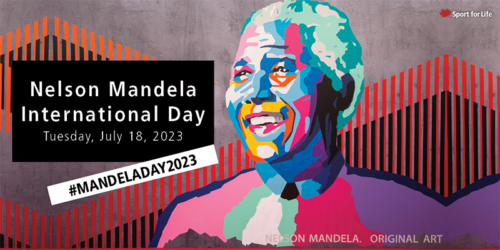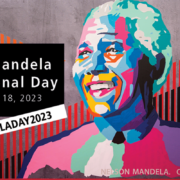Sport for Life celebrates social sport legacies on International Nelson Mandela Day
 Sporting events have the potential to create lasting social legacies on a global scale, and few people understood this better than Nelson Mandela.
Sporting events have the potential to create lasting social legacies on a global scale, and few people understood this better than Nelson Mandela.
The first democratically elected president of South Africa and an instrumental figure in the fight against the evils of apartheid, Mandela spent decades incarcerated as a prisoner of conscience before emerging as an international symbol of peace and unity. During his years as president and beyond, he championed the transformative power of sport.
He is celebrated every year on July 18 as part of International Nelson Mandela Day, which the United Nations voted to observe starting in 2009 – a testament to the way Mandela continues to inspire people worldwide.
“Power to change the world”
Once he took power, Mandela utilized sport to unite his people in the lead-up to his country’s Rugby World Cup gold medal performance in 1995. For Mandela, the victory helped to reframe his country’s global reputation after years of it being isolated on the international stage. It began to ease the racial tensions between the white and Black population, and paved the way for disenfranchised athletes to gain access to elite teams and prove their merit.
“Sport has the power to change the world … It laughs in the face of all types of discrimination,” he said at the time, championing the phrase “One Team, One Country.”
A lasting impact
This is the sort of lasting influence Sport for Life had in mind when publishing our resource Building Social Legacies, which explores the long-term impacts that sport events can have. The case can be made that the following social legacies are just as relevant and perhaps more important than other event legacies:
- greater community cohesion,
- improved accessibility,
- additional community programming,
- enhanced volunteerism,
- greater overall sport participation, and
- increased physical activity and improved health of citizens.
“The values that Nelson Mandela stood for are universal, and his example still resonates decades after his death.,” said Billie Tes, Sport for Life’s Manager of People and Culture.
“I am personally inspired by his example, and through our work here at Sport for Life we continue his unrelenting work to pursue anti-racism, bring people together, and reach people through the positive influence of sport and physical activity.”
Things to keep in mind when organizing major sporting events
A successful sporting event has the potential to impact not only the participants, but everyone involved – including the spectators. To maximize the potential to create a lasting legacy, you can follow these steps:
- Encourage the active involvement of the community in planning side events.
- Consider providing micro grants to community groups to organize community celebrations or festivities that engage citizens in the process of planning and delivering community-building social legacies.
- Be the matchmaker. Lasting social legacies are enhanced by bringing together groups and organizations that typically do not work together.
- Consider what your event is doing to break down existing social barriers (e.g., addressing poverty, improving access for all, and building a sense of belonging).

